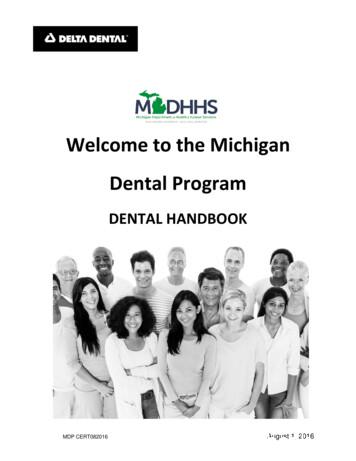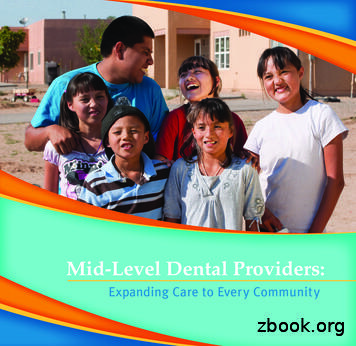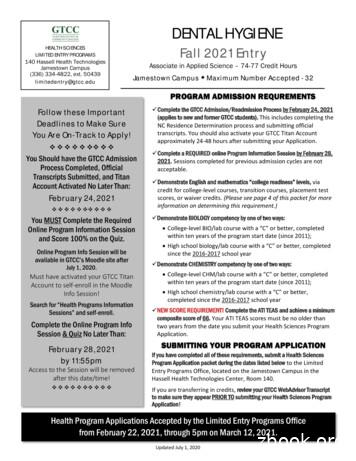HARVARD SCHOOL OF DENTAL MEDICINE
HARVARD SCHOOL OFDENTAL MEDICINESTUDENT HANDBOOK2019-2020 July 2019Harvard School of Dental Medicine
MissionThe mission of the Harvard School of Dental Medicine (HSDM) is to develop andfoster a community of global leaders dedicated to improving human health byintegrating dentistry and medicine at the forefront of education, research andpatient care.VisionIts vision is to transform dentistry by removing the distinction between oral andsystemic health.Harvard School of Dental Medicine Student Handbook 2019-202
Table of ContentsACADEMIC INFORMATION . 5DMD DEGREE PROGRAM . 5ADVANCED GRADUATE EDUCATION PROGRAMS. 16FAMILY EDUCATIONAL RIGHTS AND PRIVACY ACT (FERPA) . 32POLICIES OF THE SCHOOL AND HARVARD UNIVERSITY . 34HSDM STUDENT RIGHTS AND RESPONSIBILITIES. 35POLICIES RELATED TO REGISTRATION AT HSDM . 37POLICIES RELATED TO ATTENDANCE AT HSDM . 39POLICIES RELATED TO ACADEMIC, PROFESSIONAL, AND SCIENTIFIC CONDUCT. 48POLICIES RELATED TO ACADEMIC PERFORMANCE . 59POLICIES ON PROMOTION AND PROBATION . 61POLICIES REGARDING TUITION PAYMENT AND FINANCIAL RESPONSIBILITIES . 67PROCEDURES FOR CONSIDERATION OF PERFORMANCE AND CONDUCT . 69PROCEDURES FOR CONSIDERATION OF ACADEMIC AND CLINICAL PERFORMANCE . 69PROCEDURES FOR CONSIDERATION OF ALLEGATIONS OF PROFESSIONAL AND ETHICAL MISCONDUCT . 70PROCEDURES FOR HANDLING COMPLAINTS INVOLVING STUDENTS PURSUANT TO THE SEXUAL AND GENDER-BASEDHARASSMENT POLICY . 74STUDENT HEALTH AND SAFETY. 81STUDENT LIFE . 87STUDENT GOVERNMENT . 87STUDENT ORGANIZATIONS . 90PROFESSIONAL ORGANIZATIONS AND STUDENT MEMBERSHIPS . 92ACADEMIC . 95SERVICES FOR STUDENTS WITH DISABILITIES . 97GENERAL . 101MEDICAL AREA FACILITIES AND RESOURCES . 105COMPUTER RESOURCES. 107POLICY ON ELECTRONIC COMMUNICATION AND SOCIAL MEDIA . 108RESIDENTIAL LIFE . 110DISCLOSURES . 113APPENDICESI.II.III.Administrative ResourcesHSDM AGE Courses 2018-2019Competencies for the General DentistHarvard School of Dental Medicine Student Handbook 2019-203
IV.V.VI.VII.VIII.2018-2019 Critical Dates for DMD and AGE StudentsADEA Statement on Professionalism in Dental EducationAnnual Copyright DisclosureConflict of Interest PolicyAuthorship GuidelinesSUPPLEMENTSSummary of Massachusetts Laws Related to AlcoholSummary of Massachusetts Laws Related to Substance AbuseWhen Drinking is a ProblemMassachusetts Anti-Hazing StatuteHarvard University Policy on working with MinorsHSDM Policy on Children in the WorkplacePLEASE NOTE:At times, a mid-year review of academic, financial, or other considerations may lead to changes in policies,rules, and regulations. Harvard School of Dental Medicine therefore reserves the right at any time to makechanges to the Student Handbook that may affect such matters as tuition and other fees, degrees andprograms offered (including the modification or possible elimination of degrees and programs), degree andother academic requirements, academic policies, rules pertaining to student conduct and discipline, fields orareas of concentration, and other rules and regulations applicable to students.Harvard School of Dental Medicine Student Handbook 2019-204
ACADEMIC INFORMATIONEDUCATIONAL PROGRAMSDoctor of Dental Medicine Programx Doctor of Dental Medicine Degree (DMD)Advanced Graduate Education Doctor of Medical Science Degree with specialty training (DMSc) Doctor of Medical Science Degree without specialty training (DMSc) Master of Medical Science Degree with specialty training (MMSc) Certificate - specialty training with ODP (Other Degree Program) Certificate Programs (Non -Degree)DMD DEGREE PROGRAMPreclinical EducationThe philosophy of dental education at the Harvard School of Dental Medicine (HSDM) is that dentistry is aspecialty of Medicine. Therefore, during the first twelve months of the DMD program, students in the Pathwayscurriculum will study the preclinical basic sciences and pathophysiology at Harvard Medical School. In additionto their biomedical training, DMD students also begin their study of oral health at HSDM in Year 2. The coursesat both the Medical School and Dental School are taught in innovative flipped classroom and case-basedcollaborative formats. By the end of the second year, DMD students have a solid foundation in preclinicalmedicine and dentistry.Clinical EducationThe third year of training at HSDM is an intensive one devoted exclusively to the development and refinementof diagnostic and clinical skills. Didactic training takes place in a series of interdisciplinary blocks where dentaland oral health problems are integrated with clinical instruction. Clinical training, based on comprehensivepatient care, is woven longitudinally through each of the sequential course blocks. In addition, students preparea formal presentation of a case of his or her choice.The fourth year of training focuses on enhancing clinical skills and competencies both inside and outside of thedental school environment. With a focus on providing patient-centered comprehensive care, students arerequired to complete a number of cases of differing levels of complexity in the Case Completion Curriculum.Students participate in a number of required externships at Harvard affiliated institutions including a 12 weekGeneral Dentistry rotation at a Community Health Center, a 4 week oral surgery rotation at Boston Children’sHospital or MGH, and a 12 week Comprehensive Care rotation at HSDM. In addition, students may participatein elective rotations such as Pediatric Dentistry, Orthodontics, Implant Dentistry, Dental Public Health, GeneralDentistry, Oral Medicine or medical clerkships. When not participating in a required or elective rotation,students will treat patients in the HSDM Comprehensive Care Clinic. All students are also required to presenta completed case of his or her choice during the fourth year. The result of this comprehensive, interdisciplinaryclinical training is that students reach a solid level of competency in all areas of clinical general dentistryincluding Oral Diagnosis, Oral Radiology, Treatment Planning, Pain Control, Endodontics, Operative Dentistry,Periodontics, Prosthodontics (Complete, Fixed, and Removable), Oral Surgery, Orthodontics, and PediatricDentistry.Elective time in Year 4 can be a valuable component of the educational experience. Elective rotations are notrequired and must be approved in advance by the student’s Senior Tutor and the Associate Dean for DentalEducation. To schedule an elective rotation, students must complete a Rotation Request Application whichprovides information on the type of rotation, dates of attendance, site location and director. This form will bereviewed by the Office of Dental Education (ODE) and permission to pursue the rotation will be granted ordenied based upon the academic justification of the rotation, the student's general level of progress orHarvard School of Dental Medicine Student Handbook 2019-205
readiness, and the compatibility of the rotation with the student's schedule of required rotations for the year.An evaluation of performance will be expected from the person coordinating the elective rotation so thatstudents can receive credit for each rotation.Research TrainingIn addition to didactic and clinical training, research is a required component of the HSDM curriculum. Studentswill learn to critically read scientific literature, design studies, and analyze data. The research programculminates in a "hands on" research experience for each student, resulting in a written paper and formalpresentation at Student Research Day. Detailed information about the predoctoral research program isprovided by the Office for Research.RESEARCH REQUIREMENTS AND HONORSAll DMD students at HSDM must complete a scholarly project as part of their graduation requirement. Studentswho wish to gain additional research experience may elect to complete additional requirements and apply forhonors in a special field research, a degree designation that is granted upon the evaluation of the project andrecommendation by the Research Committee and approval by the Committee on Promotions.To be considered for Honors in a Special Field Research, a student must complete the followingadditional requirements:1. Completion of a comprehensive research project2. Written research thesis or manuscript3. Thesis defense presentationStudents should refer to the DMD Research Guidebook for detailed information regarding their requirements.STANDARDIZED EXAMINATIONSNational Board Dental ExaminationsDMD degree candidates must pass Parts I and II of the NBDE in order to graduate. Please refer to the ADAwebsite for the policies, timelines and fees for Parts I and II of the Boards. Both Part I and Part II are computerbased exams and require submissions of an on-line application and an appointment at a testing center to takethe actual exam. Student eligibility and application approval for Parts I and II is granted by the Office of DentalEducation. Please contact the Office of Dental Education for more information.NBDE Part IxxxFor Class of 2021, NBDE Part I must be taken during the break following the Oral SystemSciences/Principles of Oral Health/Scholarship in Oral Health courses.Failure to take the examination prior to the start of Diagnosis, Treatment Planning and Prevention(DTP) or to pass the examination may impede a student’s transition into the clinical curriculum.Students MUST inform Dr. Park in writing prior to February 1 if there is a reason they will be unable totake this examination during the specified period: Sang Park@hsdm.harvard.edu or 617-432-4247.Failure of NBDE Part IxA minimum of 90 days must separate a candidate’s reexamination on the NBDE Part I. NBDE Part Icandidates who have not passed an examination after three attempts will be required to wait 12months after their third attempt before they can apply for Re-examination. After the 12-month waitingperiod has lapsed, a new cycle will apply. Candidates are encouraged to seek formal remediationbefore reexamination. Under the JCNDE’s 5 Years/5 Attempts Eligibility Rule, candidates must passHarvard School of Dental Medicine Student Handbook 2019-206
xthe examination within a) five years of their first attempt or b) five examination attempts, whichevercomes first.Students at HSDM who do not pass Part I of the NBDE will not be promoted to the 3rd year and willnot be permitted to assume patient care responsibilities. This may result in delay in completing theprogram or graduation.NBDE Part IIxxxxMust be taken between the end of Year 3 (July) through mid-December of Year 4.Students will be eligible to take the exam upon submitting the Integrated Comprehensive Exam (ICE)Acknowledgement form.Failure to take the NBDE Part II by the end of December of Year 4 or to pass the examination mayimpede a student’s progress in the fourth year curriculum and may result in a delay of graduation and adelay in the dental licensure process.Students MUST inform Dr. Park in writing before the start of the exam period if there is a reason theywill be unable to take this examination during the specified time. Sang Park@hsdm.harvard.edu or617-432- 4247.Failure of NBDE Part IIxxA minimum of 90 days must separate a candidate’s reexamination of the NBDE Part II. NBDE Part IIcandidates who have not passed an examination after three attempts will be required to wait 12 monthsafter their third attempt before they can apply for reexamination. After the 12-month waiting period haslapsed, a new cycle will apply. Candidates are encouraged to seek formal remediation beforereexamination. Under the JCNDE’s 5 Years/5 Attempts Eligibility Rule, candidates must pass theexamination within a) five years of their first attempt or b) five examination attempts, whichever comesfirst. This applies to examination attempts occurring on or after January 1, 2012. Examination attemptsoccurring prior to this date are not considered under this regulation.Students at HSDM who do not pass Part II of the NBDE before the last promotions meeting in May willnot be permitted to graduate from the DMD program.Please click here eral-information) for information aboutthe exam and registration process.Comprehensive ExamsHSDM does not require students to take the Commission on Dental Competency Assessments Exam or anyother licensure examination in order to graduate. However, all students must take and pass Schooladministered Comprehensive Examinations, regardless of whether or not they intend to take the actual CDCAexam. Students may not take other regional board exams (e.g. the Western Regional Board Exam) prior topassing the HSDM Comprehensive Exams. Approval to take other (non-CDCA) regional board exams will begiven only after all sections of the Comprehensive Exams have been passed.The Commission on Dental Competency Assessments (CDCA)Although not required for graduation, HSDM does permit the Commission on Dental CompetencyAssessments (CDCA) to be administered at the School. The Curriculum Integrated Format (CIF) CDCA isoffered, with manikin sections of the exam administered in the fall of Year 4, and the patient- based portions ofthe exam offered in the spring. Students must apply to take the CDCA in the summer prior to Year 4.Comprehensive Exams (see above) are administered approximately 6 weeks prior to the fall and spring CDCAtest dates. In the event that a student must retake a portion of the Comprehensive Exam, the deadline forretaking and passing the makeup exam is 14 days prior to the actual CDCA test date. The School will withdrawHarvard School of Dental Medicine Student Handbook 2019-207
from the CDCA any student who fails to pass all sections of the Comprehensive Exam by this deadline.Students withdrawn from the CDCA for academic reasons forfeit the examination fees paid to the Commissionon Dental Competency Assessments.Harvard School of Dental Medicine Student Handbook 2019-208
DMD CURRICULAR OPTIONSHarvard School of Dental Medicine offers students in the DMD program the ability to pursue approved alternativecurricular tracks, fellowships and joint degree programs. Prior to applying for an alternative curricular track orprogram, a student must first petition the Committee on Promotions for eligibility and approval. There are certainpoints within the DMD curriculum that lend themselves to stepping out of the program to pursue an alternativecurricular track or special program. In order to avoid a significant disruption in the continuity of patient care,students are not permitted to step out of the DMD program between the third and fourth year of theprogram. The Associate Dean for Dental Education in conjunction with the Committee on Promotions will provideguidance on appropriate times within the DMD curriculum to step out to pursue alternative programming.FIVE YEAR PROGRAMIn September, 1999 the Curriculum Committee of the Harvard School of Dental Medicine approved a proposalto provide individual students the opportunity to fulfill their DMD degree requirements over a period of five,rather than four academic years. The optional additional year is intended to enable such students to include asignificant enrichment experience as part of their educational program. The Office of Dental Education hasdeveloped the following guidelines for the optional Five Year DMD.Acceptable Activities for Enrichment YearTypical activities in which students might participate include research, community service, internationalhealth initiatives, and public health or public policy programs.Program Time and DurationIt is expected that the enrichment program will last a minimum of 10 months and a maximum of 12 months,depending on the curriculum year in which the student is enrolled. Specific dates for departure and return willbe established at the time the student’s request is reviewed and approved.HSDM OversightDr. Sang Park, Associate Dean for Dental Education, is responsible for coordinating the Five Year Curriculumand for overseeing students who are enrolled in this option.Application and Review ProcessStudents must be in good standing to be eligible to apply for the Five Year DMD. All Unsatisfactory orIncomplete work must be made up before the request for a Five Year DMD Curriculum will be considered. Awritten request to change to the Five Year Curriculum must be submitted to Dr. Park who will present therequest to the Committee on Promotions for review. The Proposal must include information about theintended activity, sponsorship, location, duration, and supervision. Documentation from the student’s sponsoror mentor should accompany
General Dentistry rotation at a Community Health Center, a 4 week oral surgery rotation at Boston Children’s Hospital or MGH, and a 12 week Comprehensive Care rotation at HSDM. In addition, students may participate in elective rotations such as Pediatric Dentistry, Orthodontics, Implant Dentistry, Dental Public Health, General
Life science graduate education at Harvard is comprised of 14 Ph.D. programs of study across four Harvard faculties—Harvard Faculty of Arts and Sciences, Harvard T. H. Chan School of Public Health, Harvard Medical School, and Harvard School of Dental Medicine. These 14 programs make up the Harvard Integrated Life Sciences (HILS).
DENTAL SCIENCES 1 Chapter 1 I Dental Assisting— The Profession 3 The Career of Dental Assisting 4 Employment for the Dental Assistant 4 The Dental Team 6 Dental Jurisprudence and Ethics 12 Dental Practice Act 12 State Board of Dentistry 12 The Dentist, the Dental Assistant, and the Law 13 Standard of Care 13 Dental Records 14 Ethics 14
Cigna Dental Care DMO Patient Charge Schedules 887394 09/15 CDT 2016 Covered under Procedure Code1 Dental Description and Nomenclature Cigna Dental 01 and 02 PCS Cigna Dental 03 PCS Cigna Dental 04 PCS Cigna Dental 05 PCS Cigna Dental 06 PCS Cigna Dental 07 PCS Cigna Dental 08 PCS Chair Time Per Y/N Minutes Code # (if different) Y/N Code # (if .
is a detailed list of dental services provided by a dental office and given to Delta Dental for payment. Delta Dental means Delta Dental Plan of Michigan, Inc., a service provider for dental benefits under the Michigan Dental Program. Delta Dental ID Card is a permanent (not monthly) card. We send
Mid-level dental providers, variously referred to as dental therapists, dental health aide therapists and registered or licensed dental practitioners, work as part of the dental team to provide preventive and routine dental services, such as cleanings and fillings. Similar to how nurse practitioners work alongside physicians, mid-level dental .
Jun 14, 2016 · active duty Soldiers treated at any of five dental clinics on Fort Bragg. These clinics included Davis Dental Clinic, Joel Dental Clinic, LaFlamme Dental Clinic, Pope Dental Clinic, and Smoke Bomb Hill Dental Clinic. For each appointment the appointment type, date, and dental wellness class
DEN 131 Dental Hygiene Clinic 1 3 credits . Summer 2022. DEN 125 Dental Office Emergencies 1 credit DEN 140 Dental Hygiene Theory 2 1 credit DEN 141 Dental Hygiene Clinic 2 2 credits DEN 222 General and Oral Pathology 2 credits . Fall 2022. DEN 123 Nutrition/Dental Health 2 credits DEN 220 Dental Hygiene Theory 3 2 credits DEN 221 Dental .
Dental Blue for Individuals. SM - a consumer-driven dental plan for individuals and their eligible dependents . Dental Blue for Seniors. SM - a consumer dental product for individuals and their spouse age 65 and older . Dental Blue For Federal Employee Program - offers federal employees a dental supplemental plan to























